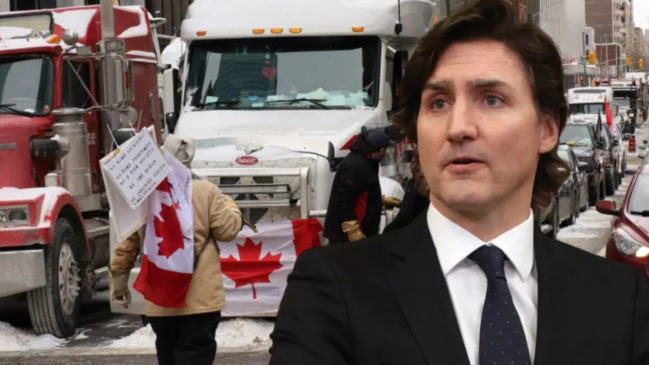Canada’s national police have sent letters to cryptocurrency exchanges asking them to freeze at least 34 crypto addresses allegedly connected to the Freedom Convoy protests under the Emergencies Act recently invoked by Prime Minister Justin Trudeau. Banks have also received letters about “designated persons” tied to the protests as the police vow to take back Ottawa.
Canadian Police Order Exchanges to Freeze Crypto Addresses
Canada’s federal police force, the Royal Canadian Mounted Police (RCMP), has reportedly sent letters to financial institutions, including banks and cryptocurrency exchanges, with a list of individuals and crypto addresses.
The letter to crypto exchanges demands that they “cease facilitating any transactions” with a list of 34 crypto wallet addresses it provides. Claiming that these wallet addresses are associated with the Freedom Convoy protests, the RCMP wrote:
The Ontario Provincial Police and Royal Canadian Mounted Police are currently investigating cryptocurrency donations being collected in relation to illegal acts falling under the scope of the Emergency Measures Act.
The letter continues: “Pursuant to the Emergency Economic Measures Order, under subsection 19(1) of the Emergencies Act, there is a duty to cease facilitating any transactions pertaining to the following cryptocurrency address(es).”
Among the 34 crypto addresses, 29 are bitcoin (BTC) addresses and two are ethereum (ETH) addresses, the Counter Signal reported, citing a letter it has obtained. The remaining three are cardano (ADA), monero (XMR), and litecoin (LTC) addresses.
At least one wallet containing over $1 million in bitcoin was part of the Honkhonkhodl campaign to support truckers, the publication conveyed, adding that each wallet has transacted cryptocurrencies worth between $0 and $1.1 million.
The RCMP added that “Any information about a transaction or proposed transaction in respect of these address(es), is to be disclosed immediately to the Commissioner of the Royal Canadian Mounted Police.”
Banks Receive Letters About ‘Designated Persons’
Traditional financial institutions, including banks, reportedly received a different type of letter from the RCMP. The letters to banks name about 20 people the police have identified as being involved in activities related to the Freedom Convoy protests, the Globe and Mail reported, citing a source who has reviewed the document.
The letters include pictures and summaries with details about the people, some of whom were allegedly the main organizers of the protests.
The Canadian Bankers Association (CBA) confirmed banks have received letters about “designated persons” from the RCMP. Financial institutions must now disclose these customers’ banking details and transaction records to the RCMP or the Canadian Security Intelligence Service. However, they can decide themselves whether to freeze accounts or cut off services.
Trudeau’s Emergencies Act and Police’s Vow to Take Back Ottawa in Entirety
Canadian Prime Minister Justin Trudeau invoked the Emergencies Act Monday to deal with the Freedom Convoy protests in Ottawa. The Act gives law enforcement additional powers to respond to continuing blockades and protests against pandemic restrictions. Specifically, it enables financial services providers to “immediately freeze or suspend the account of an individual or business affiliated with these illegal blockades without a court order.”
Steve Bell, interim police chief with the Ottawa Police Service, told the city council Wednesday:
We are going to take back the entirety of the downtown core and every occupied space.
Bell explained that police officers will enforce a plan to remove anyone who refuses to leave, stating, “You will be hearing and seeing these actions in the coming days.”
What do you think about how the Canadian government is handling the Freedom Convoy protests? Let us know in the comments section below.
Image Credits: Shutterstock, Pixabay, Wiki Commons
Disclaimer: This article is for informational purposes only. It is not a direct offer or solicitation of an offer to buy or sell, or a recommendation or endorsement of any products, services, or companies. Bitcoin.com does not provide investment, tax, legal, or accounting advice. Neither the company nor the author is responsible, directly or indirectly, for any damage or loss caused or alleged to be caused by or in connection with the use of or reliance on any content, goods or services mentioned in this article.



